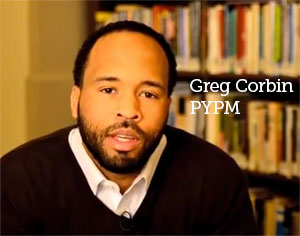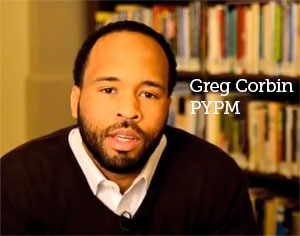
Philly on the rise: Young people offer solutions to big city challenges
Photo Credit: Flickr user bittermelon.
Philadelphia, the fifth largest city in the nation, is still bustling with the entrepreneurial spirit of the nation’s Founding Fathers. A statue of William Penn stands atop City Hall; he overlooks some of the scrappiest pioneers of the 21st century, men and women who feel personally responsible for finding the answers to complex community issues. Philadelphia At A Glance
Founded: 1682 City Population: 1,536,471 Median Household Income: $36,251 Diversity Demographics
Caucasian/White: 41.0% African-American: 43.4% Hispanic: 12.3% Age Demographics
under 19: 26.3% 20-34: 25.7% 35-43: 25.3% 55+: 22.6% Knight active grants portfolio: 112 projects totaling $31.7M
The city faces many of the same challenges as other urban centers; poverty, crime and a struggling public education system. But unlike most cities today, Philadelphia’s population is on the rise, according to a recent Pew Research Center study that clearly portrays a city in transition. More than 50,000 Millennials ages 25 to 35 have come to Philly to stay in the last decade; the number of residents with college degrees has likewise increased. Donna Frisby-Greenwood, Knight Foundation Philadelphia program director, says Knight and the city recognize that young people are the city’s strongest asset. They are powering the emergence of a creative economy in Philadelphia, and central to Knight Foundation’s strategy of building a more informed, engaged community that can shape its own future. “We must now collectively focus on keeping these young artists, entrepreneurs and social change agents,” says Frisby-Greenwood, who runs a portfolio of $31.7 million in active grants. “We do that by deepening their engagement and ultimately their attachment to our city. We have the opportunity to help continue Philadelphia’s rise.” A recent Soul of the Community survey conducted by Knight Foundation and Gallup shows that aesthetics, openness and other social and cultural offerings are key factors for resident retention. Frisby-Greenwood says Philadelphia already has more than 130 higher education opportunities in the metropolitan region and, in the last decade, the number of non-native graduates who stay in Philly after graduation has increased from 23% to nearly 50%. Helping to increase retention is 2007 Knight grantee Campus Philly, a website that, in its own words, serves as a master list of must-sees and dos, “where students meet their Philadelphia.” Campus Philly president Deborah Diamond is a Philadelphia native who says attracting students through engagement is the project’s strong-suit. Ideally, a student’s introduction to the city begins with a Philadelphia guide booklet on his or her dorm room pillow and ends with a handshake between a talented graduate and a local, hiring business person. “I want Campus Philly to be the reason Philadelphia becomes the young person’s capital of the United States,” Diamond says. “It’s starting to happen because we’re investing in the spirit of collaboration.”Philadelphia Leadership
One of Philadelphia’s most engaged young leaders talks about empowering the city’s young people. Read more.
Attachment through aesthetics is strongly supported by Knight Foundation’s arts program. Recent initiatives have served to expand definitions of art and place in Philadelphia by making art readily accessibly to the public. Presenting art all year long is the Pig Iron School for Advanced Performance Training, a two-year professional training program for actors and directors. Founders of the school hope to offer performances year-round and accept international students.
Knight also supports Philadelphia in the quest to increase access to public services and local government. Code for America, for example, recruits the top technology talent to give a year of service to build innovative web applications. “Philadelphia is not just the tale of two cities,” Frisby-Greenwood says. “We have our problems, same as any city. The difference is that we have people here who see themselves as the solution.” The solutions include connecting the less fortunate parts of Philadelphia to downtown’s rise, or at least to the opportunities offered by the Internet. When Brian Kirk learned that 40 to 50 percent of Philadelphians lacked Internet access, he decided to do something about it. The global financial crisis had left both Kirk, a 2008 Temple University graduate, and his friends bootstrapping for funds for a big idea: Technically Philly, a group that would develop a from-scratch mobile application to help Philadelphians find nearby Internet access and computer training opportunities. “The tech community wants to get involved with the city, to give back and make better the place that they live,” Kirk said. “Sure, you could move to New York. But Philadelphia is a place where you can see your work actually affect people’s lives. So, it’s not about doing what’s better for tech, it’s about doing what’s best for the block.” Connect Philly received Knight funding in April, 2012 that helps to support the work of Knight partner Free Library of Philadelphia hot spots as well as Code for America. Knight funded the project as part of its effort to promote an informed and engaged Philadelphia. In addition, it complements Knight’s Project Liberty Digital Incubator with Ben Franklin Technology Partners where Knight supports tech companies inside the Philadelphia newspaper group. The project enables residents to text their location and find the closest available internet access point. Knight also supported Technically Philly in their efforts to make April 25-29 Philly Tech Week.
By Jenna Buehler, executive assistant/Communications at Knight Foundation
Recent Content
-
Artsarticle ·
-
Artsarticle ·
-
Artsarticle ·

